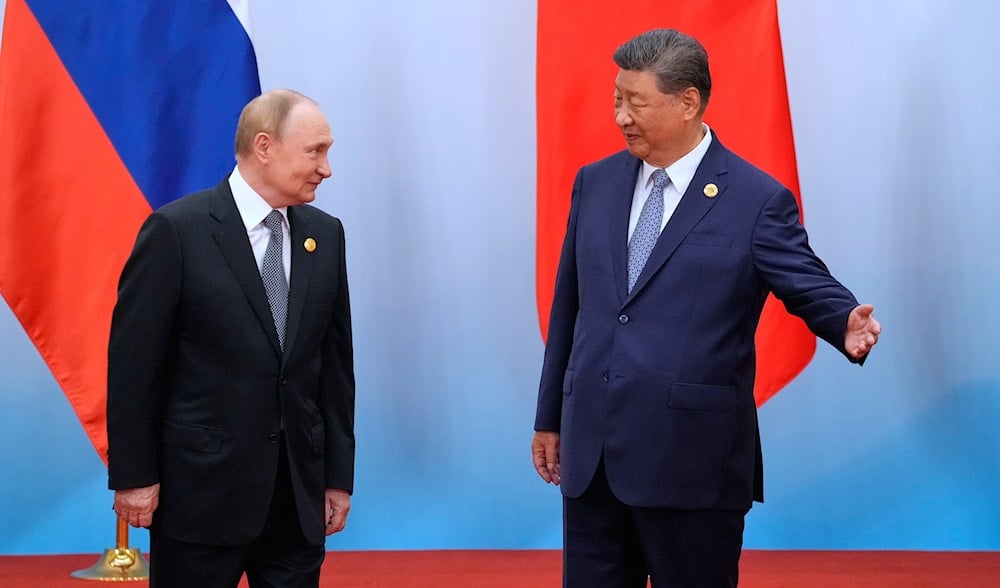Forbes: 42% of the world is now promoting pro-East narratives
At the SCO summit in Tianjin, China and Russia advanced a pro-Eastern narrative, with Xi and Putin positioning the bloc as a counterweight to US-led alliances.
-

Chinese President Xi Jinping, right, shows the way to Russian President Vladimir Putin after a photo session of the SCO summit at the Meijiang Convention and Exhibition Centre in Tianjin, China, Monday, Sept. 1, 2025. (AP)
As the Shanghai Cooperation Organization (SCO) convened in Tianjin, China and Russia sought to rally members, representing 42% of the world’s population, behind a unified anti-unilaterism, majorly imposed by the US, narrative.
A recent analysis by Forbes claims that the bloc, originally designed for regional cooperation, is increasingly positioned as a geopolitical counterweight to US-led alliances.
At the summit, Chinese President Xi Jinping and Russian President Vladimir Putin accused the United States and its allies of “militarizing” the Pacific, cyberspace, and outer space. Both leaders reiterated that the SCO is an emerging force in global diplomacy and security, capable of challenging organizations traditionally led by Washington.
Putin, in an interview with China’s Xinhua news agency, also warned that “Japanese militarism is being revived under the pretext of imaginary Russian or Chinese threats.” These remarks echoed the broader concerns voiced by Beijing and Moscow that US alliances and military cooperation are destabilizing the international order.
Shanghai Cooperation Organization’s evolution
The SCO traces its roots to 1996, when it was established as the Shanghai Five, a border-cooperation forum anchored by China and Russia. It formally became the Shanghai Cooperation Organization in 2001, with a mandate focused on regional security.
Its current members include China, Russia, Kazakhstan, Kyrgyzstan, Tajikistan, Uzbekistan, India, Pakistan, Iran, and Belarus. Myanmar has expressed interest in joining, while Turkey, a NATO ally, participated in the Tianjin summit as a partner. In total, 20 foreign leaders and 10 heads of international organizations attended.
The largest SCO Summit was held in #Tianjin, China, with leaders from around the world attending the event.
— Al Mayadeen English (@MayadeenEnglish) September 1, 2025
Countries like #Russia, #India, and #Turkey were among the attendees.
Here are key highlights from the major summit.#SCOSummit2025 #SCOSummit pic.twitter.com/3ggV0vpqe8
SCO as a counterweight to US-led alliances
Summits have increasingly been used by Beijing and Moscow to showcase their diplomatic alignment and to position the SCO as a counterweight to NATO and other US partnerships. Xi framed the organization as bearing “greater responsibilities” for regional peace and prosperity, while Putin denounced what he called Washington’s expansion of military blocs.
Beyond rhetoric, China and Russia have advanced alternative initiatives in international forums. They have promoted a treaty to prevent an arms race in outer space and established a competing UN working group on cyberspace governance, regularly accusing the US of “militarizing” the digital domain. The SCO platform has also been used to reinforce Moscow’s claims that NATO expansion is to blame for the conflict in Ukraine.
India’s strategic balancing within SCO
India has been an increasingly active player within the SCO, although New Delhi initially joined the group to help manage its fraught relationship with Pakistan.
While India maintains a tradition of non-alignment, worsening trade relations with Washington, triggered by Trump's tariffs, have prompted Prime Minister Narendra Modi to engage more directly with Beijing. His recent trip to China, the first since 2018, resulted in pledges of greater cooperation between the two states.
Read more: Russia, China, India form axis of new order, Alexander Dugin argues

 3 Min Read
3 Min Read








